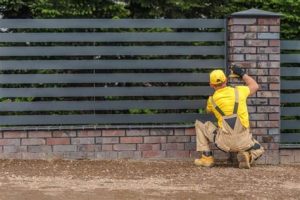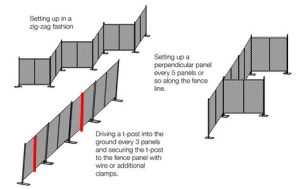Safety Regulations: Why Fence Permits Matter
Learn about fence permit regulations, the importance of obtaining a permit, potential consequences of non-compliance, and the benefits of following safety regulations.When it comes to enhancing the safety and aesthetics of your property, installing a fence can be a significant home improvement step. However, many homeowners overlook an important aspect of this process: fence permits. Understanding the regulations surrounding fence permits is crucial for ensuring compliance with local laws and avoiding potential legal issues. In this blog post, we will explore why obtaining a fence permit is vital, the potential consequences of neglecting this requirement, and the steps involved in the application process. By highlighting the benefits of adhering to safety regulations, we aim to equip homeowners with the knowledge needed to make informed decisions and promote safer neighborhoods. Let’s dive into the essentials of fence permit regulations and their implications on your property.
Understanding fence permit regulations
When it comes to installing a fence, understanding the permit regulations in your area is crucial. Many municipalities require homeowners to obtain a permit before putting up a fence, regardless of its height or material. This process is not just a bureaucratic hurdle; it ensures that fences are constructed safely and in accordance with local zoning laws, which can vary significantly from place to place.
Fence permits typically address several key aspects, including the location, height, and type of materials used. Some regulations may also consider factors such as proximity to property lines, existing easements, and overall aesthetics. For example, in residential neighborhoods, height restrictions are often imposed to maintain a certain look and feel, while in commercial areas, rules may differ significantly.
Before embarking on your fencing project, it is essential to consult your local building department or zoning office. They will provide the necessary information regarding what types of fences require permits, how to apply, and any fees involved. Ignoring these regulations can lead to fines, potential legal issues, or even the demolition of the newly erected structure.
The importance of obtaining a permit
Obtaining a fence permit is a crucial step for any property owner planning to install a fence. The importance of complying with local regulations cannot be overstated. Not only does it ensure that your fence meets safety and aesthetic standards, but it also provides legal protection for you as a homeowner.
The process of securing a fence permit often involves submitting detailed plans that outline the design, size, and location of the proposed fence. This allows local authorities to ensure that the fence adheres to zoning laws and does not hinder public safety. By understanding the importance of obtaining a permit, property owners can avoid unnecessary complications that could arise from non-compliance.
In many jurisdictions, failing to obtain a permit can lead to a range of issues, from fines and penalties to being required to remove the fence entirely. Therefore, understanding the importance of obtaining a fence permit is vital for protecting both your investment and your legal standing as a property owner.
Potential consequences of not having a permit
Not obtaining a fence permit can lead to a multitude of serious consequences for homeowners or property owners. Often overlooked, the importance of compliance with local regulations cannot be stressed enough. One of the most immediate repercussions is the risk of having to remove the fence altogether, which can be costly and time-consuming.
Additionally, homeowners who neglect to acquire the necessary permits may face fines and penalties. Local authorities take violations seriously, and legal actions can lead to monetary burdens that far exceed the cost of initially applying for a permit. These fines can vary by location but can be substantial enough to create financial strain.
In some cases, not having a permit can also affect property insurance claims. If a fence is constructed without proper authorization, insurance companies may refuse to cover any damages or incidents relating to that fence. This can leave homeowners vulnerable in the face of accidents or property damage, further exemplifying why adhering to safety regulations is critical.
Process of applying for a fence permit
Applying for a fence permit is a crucial step before beginning any fencing project. The process may vary depending on your local regulations, but typically involves several key steps. Understanding these steps can save you time and potential headaches.
- Research local regulations: Before starting, it’s essential to understand your local zoning laws and regulations. Check with your city or county’s building department.
- Prepare necessary documents: Commonly required documents include a detailed fence design, property lines, and any existing survey maps.
- Complete the application form: Fill out the application form accurately and ensure all needed details are included.
- Pay any associated fees: Most municipalities require a fee to process your fence permit application.
- Submit your application: After completing your application and gathering all necessary documents, submit them to your local authority.
- Await approval: The approval time can vary. In some cases, you might need to address any concerns raised during the review.
- Begin your project after granting: Once you receive your permit, you can confidently start your fencing project, knowing it complies with local regulations.
Remember, failing to follow the correct fence permit application process can lead to complications and fines, making it essential to adhere to these guidelines from the outset.
Benefits of complying with safety regulations
Complying with safety regulations when installing a fence is not just a bureaucratic formality; it brings a multitude of benefits that can affect homeowners, neighbors, and the community at large. One of the most significant advantages is the enhancement of property safety. A properly installed fence—backed by the right permits—ensures that the boundaries of your property are clearly defined, which helps in preventing unauthorized access and deterring vandalism.
Another major benefit is that compliance with local ordinances can increase your property’s value. When prospective buyers see that a property has been maintained according to safety standards, it can significantly enhance the appeal and perceived worth of the property. Additionally, a well-constructed fence that adheres to regulations can also contribute to a more aesthetically pleasing neighborhood, promoting overall community pride.
Moreover, securing the necessary permits can shield you from potential legal troubles in the future. In many areas, building a fence without the proper permits can lead to a series of penalties, including hefty fines or the forced removal of the fence. Thus, by adhering to safety regulations and obtaining the appropriate permits, homeowners not only fulfill legal responsibilities but also protect their investment and peace of mind.
Frequently Asked Questions
What is the purpose of fence permits?
Fence permits ensure that the construction of fences complies with local zoning laws and safety regulations, protecting property rights and public safety.
What can happen if I build a fence without a permit?
Building a fence without a permit can lead to fines, mandatory removal of the fence, and potential legal disputes with neighbors over property boundaries.
Are there different types of fence permits?
Yes, different types of fence permits may exist depending on the material, height, and location of the fence, so it’s important to check with local authorities.
How do I apply for a fence permit?
To apply for a fence permit, you typically need to submit an application form with details of the proposed fence, along with any required fees, to your local building department.
What safety regulations should I consider when installing a fence?
Safety regulations may include setbacks from property lines, height restrictions, and materials that ensure safety for both your property and adjacent public areas.
Can my neighbors object to my fence permit?
Yes, neighbors can object to a fence permit during the application process, especially if the fence violates local zoning regulations or affects their property.
How long does it usually take to get a fence permit approved?
The approval process for a fence permit can vary widely, but it typically takes a few days to several weeks, depending on the local jurisdiction and any required reviews.





